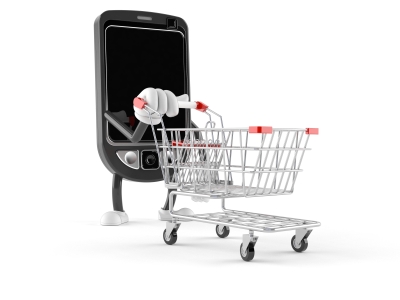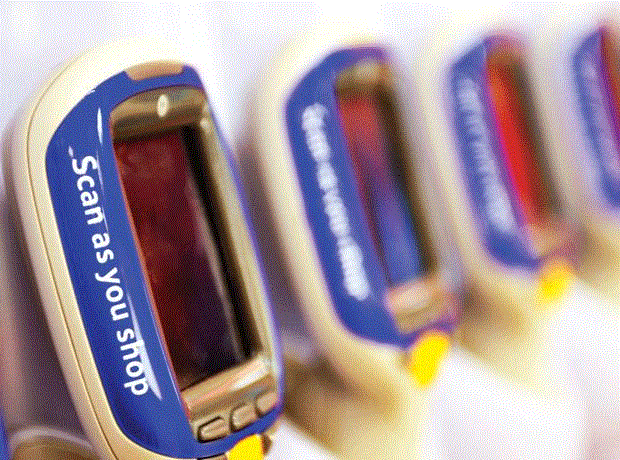
Mobile is already starting to play a big role with shoppers
in-store, with over half of consumers consulting their mobile phone to aid decisions
in-store. Whether 2013 is the long awaited ‘year of the mobile’ is yet to be
seen, but the examples below make it clear that mobile will revolutionize the
shopping experience by delivering a new level of convenience and value. With
around 65% of Australians already owning a smartphone, the revolution could
happen sooner than we think.
1. Apple’s Easypay self-assisted checkout
One of the more complete examples, Apple’s Easy Pay almost completely takes
away the need for any in-store assistance at all. Whilst browsing the store,
you simply scan the barcode of the product you’re interested in. You can then
find out all you need to know including specs, ratings, reviews and more. You
can complete the purchase then and there by paying via your iTunes account. Not
all retailers can close the complete loop like Apple, but they’re on their way…

2. Scan and shop
A number of retailers, including Sainsbury’s and Walmart, have been testing
this new service that allows users to shop with their iPhone or Android phone,
and pay at the counter without unloading their basket or trolley. Users
‘check-in’ when they enter the store via their app, and then they scan the
barcode of the items as they pick them up and put them into their basket.
When they’ve finished, they go to
the register where the products they have scanned are directly transferred to the POS
system without having to be re-scanned, allowing them to then complete payment as usual. An added benefit is that the
shopper can see the cost of the basket as they add items to the basket. An
alternate version of this approach allows users to follow the same process, but
instead of adding the items to their basket, they simply walk around the shop, scan items without adding them to their basket, pay at the check-out and their goods are delivered to them at home.

3. Scan-as-you shop devices
Recognising
that not every one of their shoppers has a smartphone, Tesco is planning to
rollout scan-as-you-shop devices after a successful pilot program ran
throughout 60 of its stores. Shoppers ‘check-out’ the scanners before entering
the shop, and they simply use the scanners to scan the barcodes on items in the
same way as the previous smartphone example. Whilst new to Tesco, these devices
have been around for some time with Waitrose offering the Quick Check since 1996.
Perhaps now we are seeing demand catch up with technology.

4. Smart Cart integrates smartphone and tablet
Taking
the power of mobility to the next level, SK Telecom is testing a Smart Cart
service in China that synchronises tablet equipped shopping carts to a shopper’s
smartphone. With the app downloaded, shoppers can search, view coupons and
create shopping lists at home. When they visit the store, the smartphone is
synchronised with the tablet, effectively bridging the gap between the pre and
during shopping stages. The system can then accurately identify where the
shopper is in the store and provide a range of things such as product locators,
product information, special offers, recommendations and more. When they arrive
at the check-out the selected items are transferred to the POS system for
payment.

4 ½. And then there's the "Smarter Cart"
Whole
Foods have put Microsoft to work to develop a Kinect-powered shopping cart that
uses a tablet and scanner to read the
items you place in the shopping cart. It includes a nice feature that
automatically crosses items off your shopping list as you drop them in the
cart. In addition, the carts are self-propelled and follow you around as you
shop!

5. The ultimate automatic checkout
It appears that Coles is working
with IBM to test a system that lets you shop and pay without having to scan the
items or stop to pay at the check-out. German shopping outlet Metro put in
place a similar system recently where an RFID tag on each product transmits
details of the trolley content to a Smartphone for payment via a synched credit
card account.

Whilst there are no doubt logistical issues to overcome with
the implementation for all of these options, including security and theft concerns,
the amount of trials taking place clearly suggests these innovations will soon become reality.
The opportunity: It’s
likely that somewhere in the business we are trialling some or all of these
right now. Regardless, it is clear that the combination of the internet and
smartphones, are putting digital at the heart of the in-store, bricks and
mortar shopping experience. We have a number of great apps already that have
the potential to go a step further and create a seamless bridge between the on
and offline shopping experience of our customers.

KC - interesting article. We're already moving in this direction (eg. Mobile Scan & Go) that is currently in beta but there is a lot of opportunity.
ReplyDelete